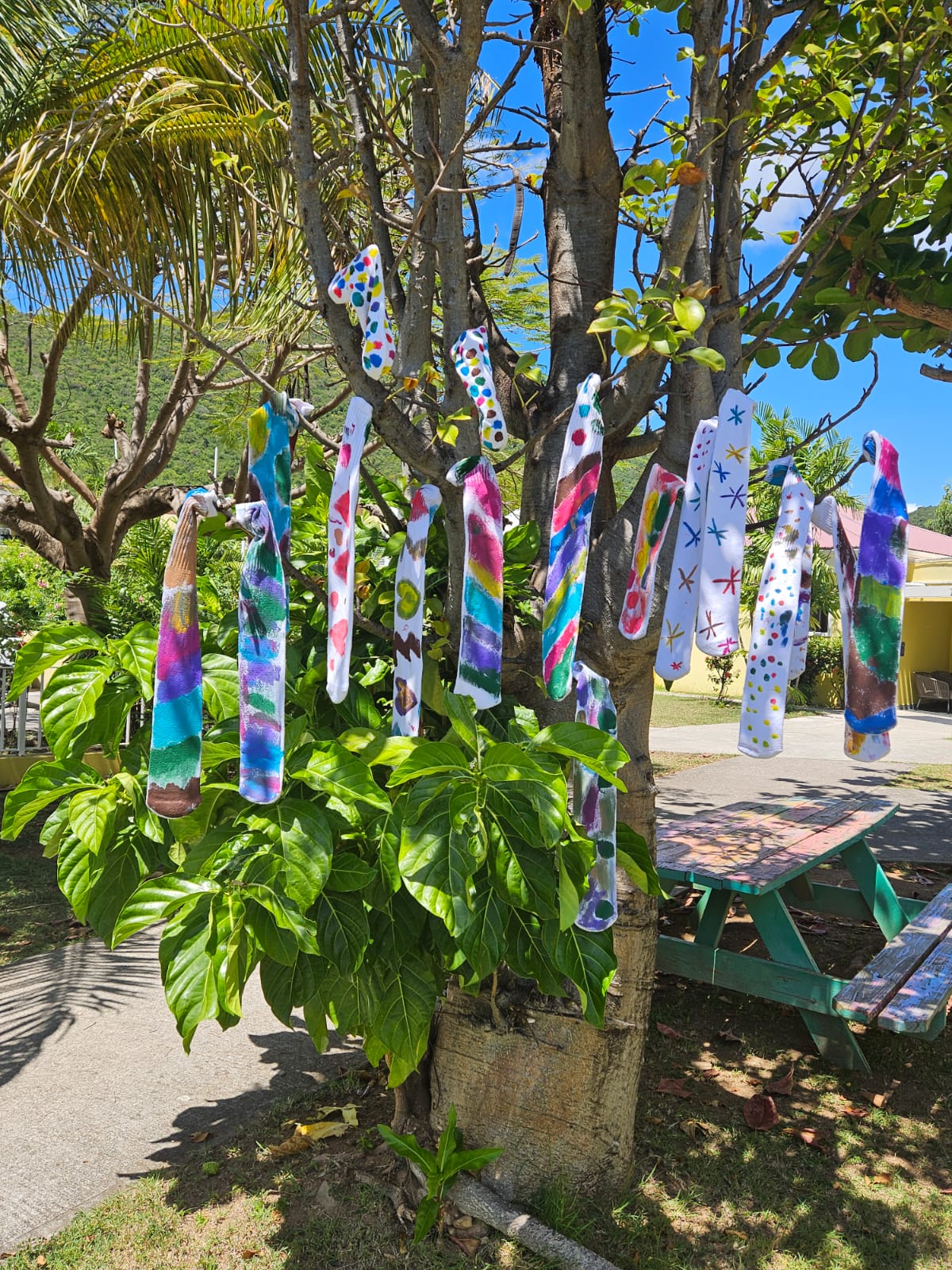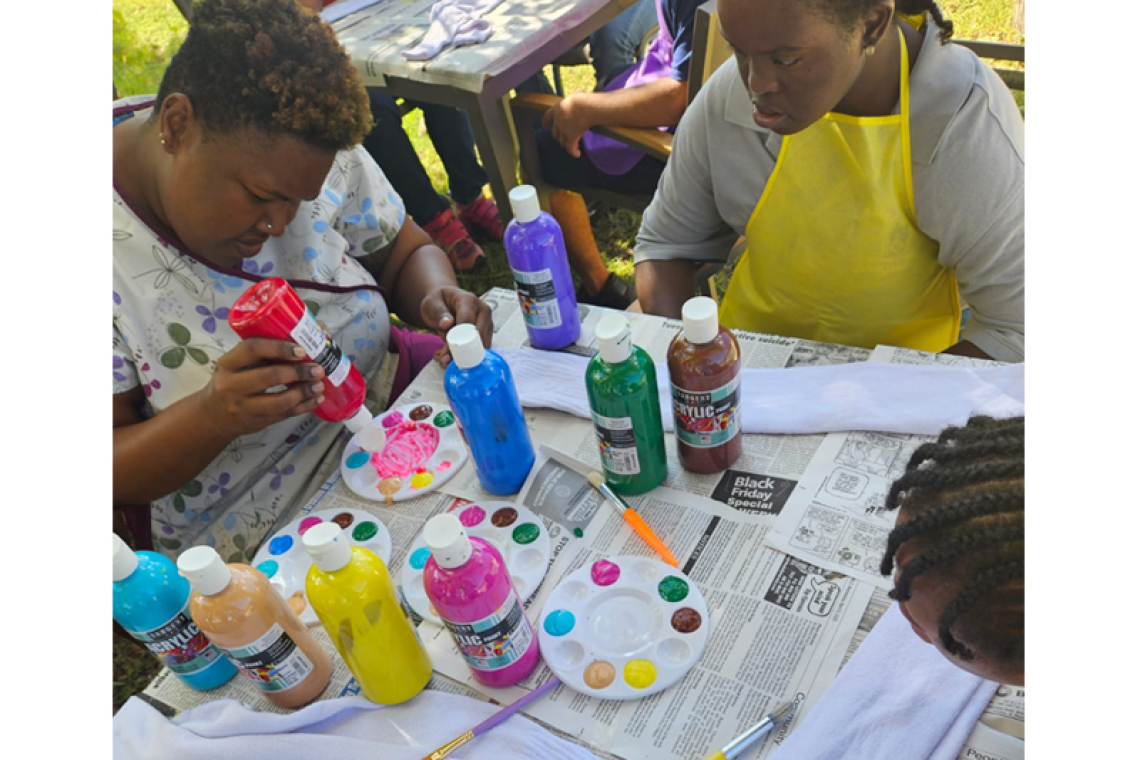On Thursday, March 12, clients at the Sister Basilia Center painted socks in preparation for World Down Syndrome Day, observed today, Thursday, March 21. Collective Prevention Sevices (CPS) urges the community to join the global campaign to by rocking their brightest and boldest socks today to raise awareness for Down syndrome.
PHILIPSBURG--Today, Thursday, March 21, is World Down Syndrome Day (WDSD) – a global awareness day officially observed by the United Nations since 2012 – to raise awareness and advocate for the rights, inclusion and well-being of people with Down syndrome. Collective Prevention Services (CPS) urges the community to join the global campaign by wearing their brightest and boldest socks today.

Freshly painted socks for World Down Syndrome Day, made by clients at the Sister Basilia Center, hang to dry.
This year’s WDSD theme “End the Stereotypes” is a call to break with stereotypes that people may have about those with Down syndrome. This because, for people with Down syndrome and intellectual disabilities, stereotypes can stop them from being treated like other people. They are often treated like children and are underestimated and excluded, as explained on the WDSD website.
In commemoration of this day, “The Daily Herald” asked a CPS representative, a nurse and a few parents to share their insights.
Although there is not an official overview of the number of persons with Down syndrome currently residing in St. Maarten, CPS Department Head Eva Lista-de Weever would like to remind the community to educate themselves on the matter. “Get to know individuals (and their families) rather than making assumptions based on a diagnosis,” Lista-de Weever states. “When you hear language or see portrayals that show stereotypes of persons with Down syndrome, speak up!”
The Sister Basilia Center cares for clients with disorders and disabilities, such as Down
syndrome, autism and cerebral palsy. Leah Joseph, who has worked with people with Down syndrome as a group leader at the centre for six years, would like to end stereotypes that cause people to underestimate her clients. “They are not disabled, but differently abled,” she says.
For new parents whose child had been diagnosed with Down syndrome, the nurse recommends seeking professional help to assist in the child’s growth and development. Above all, “have patience and a set routine with your loved one,” Joseph says.
Natalia Valda was one of those new parents when her daughter was diagnosed with Down syndrome at two weeks old. “It was during my daughter’s hospitalisation for jaundice that we began to suspect she might have Down syndrome. About a week later, our suspicions were confirmed by the doctor,” Valda says. “This revelation was a profoundly painful moment for us as we grappled with the implications of having a child with Down syndrome.”
One significant consequence of the diagnosis was emergency open-heart surgery, which was required to address a congenital heart defect commonly associated with Down syndrome, Valda explains.
Two other mothers that this newspaper spoke to also found out that their children had Down syndrome soon after giving birth.
For Nadia Sabajo Edwards, her son’s heart issues lead to his diagnosis. “We realised that he had heart problems and then he was diagnosed with Down syndrome,” she says.
Luisa Chance was advised to do a test after giving birth to her son. “The results came out positive. That day I felt my world crumble, because I had no idea at that time what it meant. I was only told he would be different. But after researching, we realised that we just had to live day by day and see how it goes.”
Though the diagnosis came as a shock for these mothers, they have since come to terms with – even embraced – the situation, learning many valuable lessons along the way. Both Chance and Sabajo Edwards say that they have become stronger and more patient. “My son taught me so much, and made me see life in a whole different way,” Chance adds.
Two of the mothers, Valda and Chance, point out that they also learned how to balance caring for their special needs child without neglecting their other children – everyone needs love, care and attention.
As Valda puts it, “Despite the challenges and additional needs my daughter with Down
syndrome may have had, it was crucial to ensure that my other daughters received equal attention and support. It required a delicate balance, but I came to understand the importance of fostering a nurturing environment where each child feels valued and cherished, regardless of their differences.”
The mothers, too, emphasise the need to break with hurtful stereotypes. According to Sabajo Edwards, children with Down syndrome are teachable and can do a lot more than one might think.
When it comes to stereotypes, it is important to recognise that those with Down syndrome are unique and have their own personalities, interests and strengths, says Valda. “Each person with Down syndrome has their own story and should be treated as an individual.”
Valda adds that negative stereotypes may perpetuate the misconception that those with Down syndrome are somehow inferior to others. “But this is simply not true. People with Down syndrome are valuable members of society who deserve respect, dignity and equal opportunities, like everyone else.”
Chance makes a similar point: “They can accomplish a lot, so why not give them that opportunity to show the world who they really are?”







